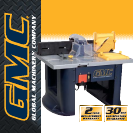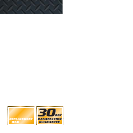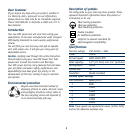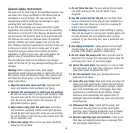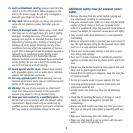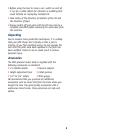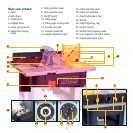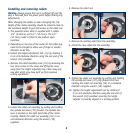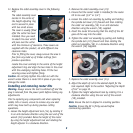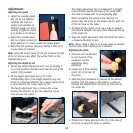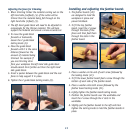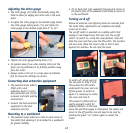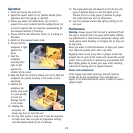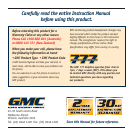
Operation
1. Insert and secure the router bit.
2. Adjust the speed, depth of cut, feather boards, fence
alignment and mitre gauge as required.
3. Ensure you adjust the infeed fence (3) so that it
supports the uncut material and the outfeed fence (4)
so that it supports the cut material, compensating for
the removed material if trimming.
4. Ensure that the dust extraction hood (7) is resting on
the table.
5. Switch on the powered router table.
6. Ensure that the
workpiece is tight
against the
fence.
7. Feed the
workpiece
smoothly from
right to left
against the
rotation of the cutter.
8. Keep the feed rate constant taking care not to feed the
workpiece too quickly resulting in the motor to slow
excessively.
9. Feeding the
workpiece too
quickly may result
in a poor quality
cut and can
damage the bit
or the motor.
10. Feeding the
workpiece too
slowly may burn or mark the cut.
11. On very hard woods or large cuts it may be necessary
to make more than one pass at progressive settings
until the desired depth of cut is achieved.
12. The proper feed rate will depend on the bit size, the
type of material being cut and the depth of cut.
Practice first on a scrap piece of material to gauge
the correct feed rate and cut dimensions.
13. Turn the powered router table off by pushing on the
red cover.
Maintenance
Warning. Always ensure that the tool is switched off and
the plug is removed from the power point before making
any adjustments or maintenance procedures. Always wear
sturdy gloves when handling or changing bits as they can
be very sharp.
Never use water or chemical cleaners to clean your power
tool. Wipe the outside clean with a dry cloth.
Regularly check to see if any dust or foreign matter has
entered the air vents of the motor and around the on/off
switch. Use a soft brush to remove any accumulated dust.
Wear safety glasses to protect your eyes whilst cleaning.
Lubricate all moving parts at regular intervals.
Power cord maintenance
If the supply cord needs replacing, the task must be
carried out by the manufacturer, the manufacturer's
agent, or an authorised service centre in order to avoid a
safety hazard.
13



